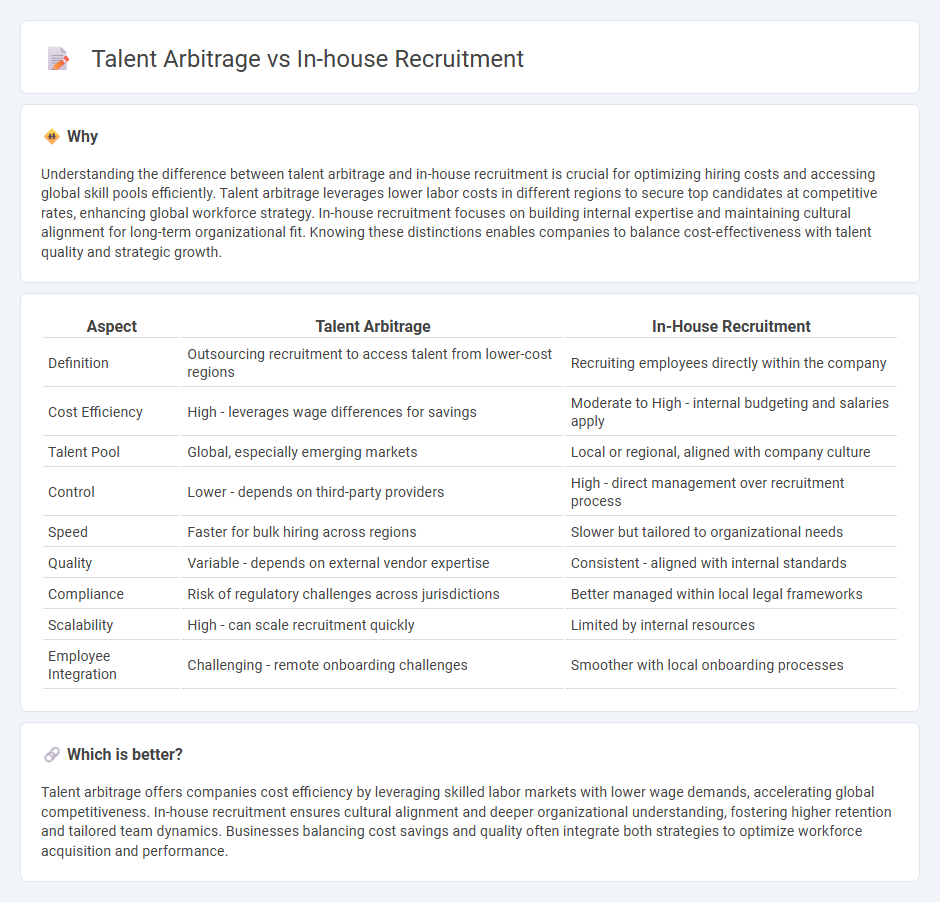
Talent arbitrage leverages global workforce variations to access skilled professionals at competitive costs, contrasting with in-house recruitment, which focuses on building internal teams tailored to company culture and specific needs. Businesses often evaluate factors like cost-efficiency, speed, and talent quality when choosing between these strategies. Explore further to understand which approach aligns best with your organizational goals.
Why it is important
Understanding the difference between talent arbitrage and in-house recruitment is crucial for optimizing hiring costs and accessing global skill pools efficiently. Talent arbitrage leverages lower labor costs in different regions to secure top candidates at competitive rates, enhancing global workforce strategy. In-house recruitment focuses on building internal expertise and maintaining cultural alignment for long-term organizational fit. Knowing these distinctions enables companies to balance cost-effectiveness with talent quality and strategic growth.
Comparison Table
| Aspect | Talent Arbitrage | In-House Recruitment |
|---|---|---|
| Definition | Outsourcing recruitment to access talent from lower-cost regions | Recruiting employees directly within the company |
| Cost Efficiency | High - leverages wage differences for savings | Moderate to High - internal budgeting and salaries apply |
| Talent Pool | Global, especially emerging markets | Local or regional, aligned with company culture |
| Control | Lower - depends on third-party providers | High - direct management over recruitment process |
| Speed | Faster for bulk hiring across regions | Slower but tailored to organizational needs |
| Quality | Variable - depends on external vendor expertise | Consistent - aligned with internal standards |
| Compliance | Risk of regulatory challenges across jurisdictions | Better managed within local legal frameworks |
| Scalability | High - can scale recruitment quickly | Limited by internal resources |
| Employee Integration | Challenging - remote onboarding challenges | Smoother with local onboarding processes |
Which is better?
Talent arbitrage offers companies cost efficiency by leveraging skilled labor markets with lower wage demands, accelerating global competitiveness. In-house recruitment ensures cultural alignment and deeper organizational understanding, fostering higher retention and tailored team dynamics. Businesses balancing cost savings and quality often integrate both strategies to optimize workforce acquisition and performance.
Connection
Talent arbitrage leverages geographic and economic disparities to source talent at competitive costs, which complements in-house recruitment strategies by expanding the talent pool beyond local limitations. In-house recruitment benefits from talent arbitrage by integrating diverse skill sets and cost-effective expertise, enhancing organizational competitiveness. Combining these approaches enables companies to optimize hiring efficiency while maintaining cultural alignment and operational control.
Key Terms
Cost Efficiency
In-house recruitment often incurs higher fixed costs, including salaries, benefits, and training for HR personnel, while talent arbitrage leverages global labor markets to reduce expenses by sourcing skilled candidates at lower wages. Talent arbitrage optimizes cost efficiency by tapping into regions with competitive salary structures without compromising on talent quality. Explore more about how these strategies impact your hiring budget and business growth.
Candidate Quality
In-house recruitment prioritizes deep organizational knowledge and cultural alignment to secure high-quality candidates tailored to specific company needs. Talent arbitrage leverages global labor market disparities to access skilled professionals at competitive costs, which may impact candidate quality consistency. Explore these strategies further to understand their effects on hiring outcomes and talent acquisition efficiency.
Control Over Process
In-house recruitment offers direct control over hiring processes, enabling personalized candidate evaluation and alignment with company culture. Talent arbitrage leverages external expertise and global talent pools, often sacrificing some process control for scalability and cost efficiency. Discover deeper insights on managing control in recruitment strategies to optimize talent acquisition outcomes.
Source and External Links
What Is An In-house Recruiter? - Full Scale - In-house recruitment is the process where companies use their internal HR staff to recruit, source, screen, and hire employees exclusively for their own organization, managing the entire hiring lifecycle internally.
In-house recruitment team structure: The blueprint for hiring success - An in-house recruitment team is dedicated to hiring within a company, focusing on aligning hires with company values, managing internal mobility, and developing recruitment strategies without outsourcing to agencies.
In-house vs agency recruitment: The pros & cons of... - Beacon Hill - In-house recruiters work as employees of an organization's HR team, collaborating closely with department heads to understand hiring needs and fill positions with a salary-based compensation model, unlike agency recruiters.
 dowidth.com
dowidth.com